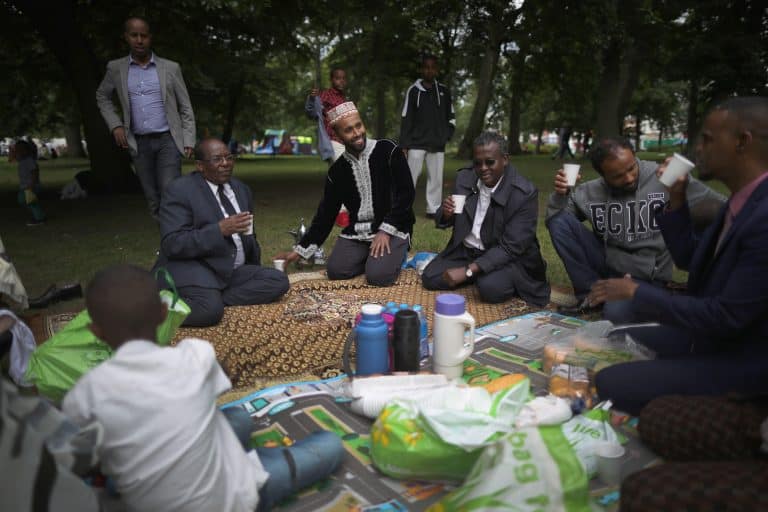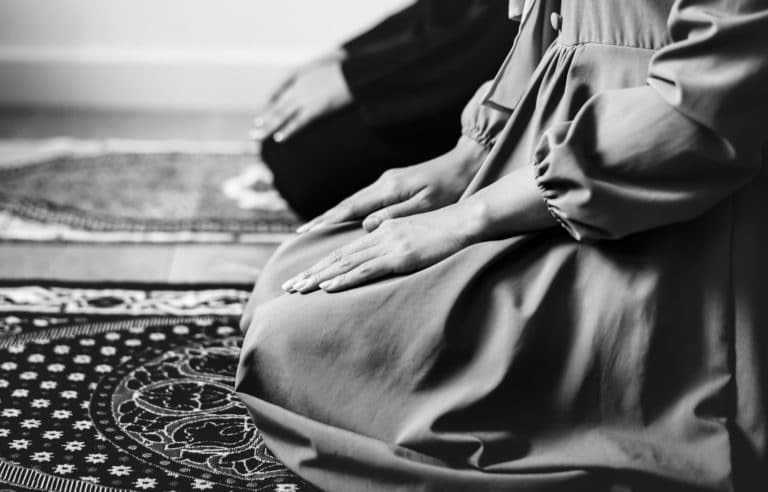
Image by Christopher Furlong/Getty Images, © All Rights Reserved.
Our Bodies Are Means by Which We Live Out Our Faith
The holy and blessed month of Ramadan is upon us. It’s a holy month for Muslims: we work on inner purification and discipline, as well as an embodied practice of empathy and justice, identifying with those for whom abstaining from food is not a choice but a daily reality.
It is a month of celebration for us. It may seem strange to celebrate not eating and not drinking (during the daytime), but the month is a joyous time: it is when the Qur’anic revelation began and a highlight of the year for Muslims. So much more so that when the month is over, there are some sweetly heartbreaking songs to say goodbye to the queen of months till next year (veda’, veda’, ya shahr-e Ramzan: “Goodbye, Goodbye, oh blessed month of Ramadan”).
One of the first pieces of public writing I ever did was called “A Date Omelette for Ramadan,” written in memory of my childhood when my mother (Pouran Safi) cooked date omelets for us. We would sit in the kitchen, listening for the distinctive Iranian call to prayer (azan/adhan) recited by Moazzenzadeh. No one could have been named more properly; his family name meant “the child of the reciter of the call to prayer.” The call to prayer would be followed by the prayer calling on God by the incomparable vocalist Mohammadreza Shajarian. This was called the “Rabbana” prayer (“Our Lord”), which brought together many of the Qur’anic verses that begin with the phrase “Our Lord.” Shajarian went on to become the most beloved classical vocalist in Iran, but it was his Rabbana prayer that would make him beloved to Iranians.
In my childhood it wasn’t Ramadan (or Ramazan, to Turkish/Persian/Urdu speakers) unless we heard the prayer recited by Shajarian. (In the aftermath of the Iranian revolution, the Iranian government would periodically ban this much beloved prayer.) The call to prayer would be following by a mystical poem from Rumi calling on the faithful to close down the mouth (in the head) and instead open up the heart and soul.
It is well known that Muslims abstain from food and water from sunrise to sunset. After the sunset, there would be a joyous return to these celebrations, often in the contexts of family celebrations. Children, the elderly, pregnant and nursing women, and the sick are not required to fast. Ramadan was a part of my life for about 30 years, from when I was a child to an adult. I fasted in college and fasted as a young father. I fasted alone and fasted with my family. One of the sweet memories of life was in college when my professor of Arabic, Shawkat Toorawa, would come to pick us up and take us to Waffle House for the morning meal, well before sunrise. He may not have known, but that act of living faith in community was so important to me at a time that I was forming my own identity as a person of faith.
A few years later I was diagnosed with diabetes. Along with that diagnosis has come the need to pay much closer attention to my blood sugar and be on guard against the rise and fall of my blood sugar. Based on the advice of both my physicians and religious guides, I was told to avoid fasting. Indeed, many people with chronic sickness are exempt.
Some of my Muslim friends joked with me, “Omid, you’re so lucky. You don’t need to fast.” Little did they know how much I miss fasting. I miss getting up for meals before sunrise, seeing my body as a means by which I live out my faith, and taking part in the communal breaking of the fast. I do “break fast” with some friends, but I know that the hunger and thirst they have experienced is one that I have not. Yes, I do feel like I am missing out on something, on the communal and embodied experience of the fast.
And yet I work to not have guilt take away from my own experience of this sacred month. This body of mine, this chubby, brown, furry, soft body of mine is a gift from God and the only body I’ll be given in this existence. It too is me, it is mine, I am it. I am more than this body, but I am also this body. And we were sent as a mercy to creation — not to curse any of it. Not even my own body that has a hard time processing sugar.
So being unable to fast physically from food and drink, I take the fast inward with me. This inward fast is one that all Muslims do and I focus on it.
My eyes fast — from glancing at what I should not — vowing to bring compassion to my glances.
My ears fast — from listening to what I should not — vowing to listen beautifully and patiently to those around me.
My tongue fasts — from speaking unkind words, from gossiping — vowing to speak words of love, words of tenderness.
My touch fasts — from a touch that would grab and desire to possess — vowing instead to bring comfort.
My heart fasts — from anger, lust, greed — vowing to be a seat for God’s breath, Divine spirit.
Ramadan Mubarak, friends.
May this fast be blessed for all who fast and cannot fast.
May there be a cleansing and purifying fast for the body, the eyes, the ears, the tongue, the touch, the heart, the soul.

